Butte: 1902

Editor’s note:
This article is an excerpt from the diary, The Story of Mary MacLane, published by Riverbend Publishing, Helena. When Mary was 19 years old, this book became a national sensation. Even Ernest Hemingway and Gertrude Stein praised it for being fresh, frank, and funny. Mary complained often about being bored but daily she took long walks around town and wrote about the mixed culture of people in those wild wild mining days.
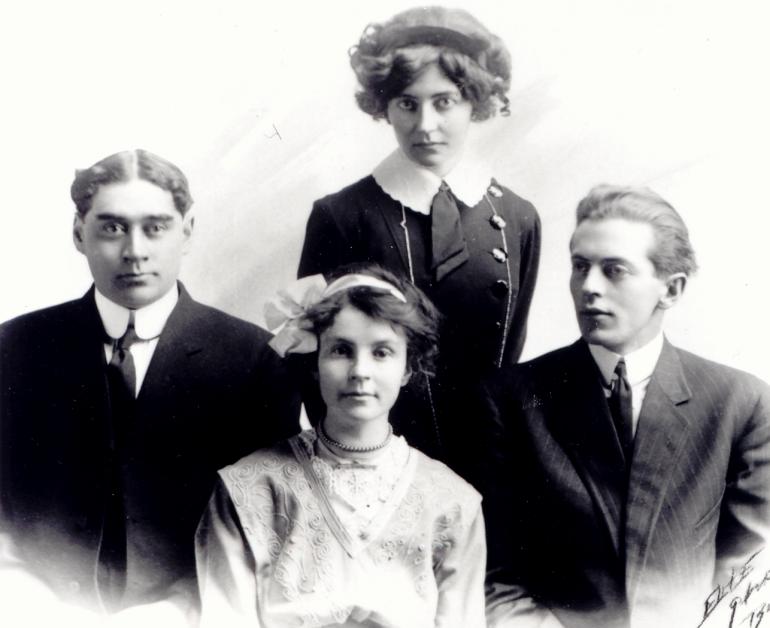
Feb. 3rd, 1902
The town of Butte presents a wonderful field to a student of humanity and human nature. There are not a great many people — 70,000 perhaps — but those 70,000 are in their way unparalleled. Bohemianism — where is Butte’s rival?
The population is not only of all nationalities and stations, but the nationalities and stations mix and mingle promiscuously with each other, and are partly concealed and partly revealed in the mazes of a veneer that belongs neither to nation nor to station, but to Butte.

At some Fourth of July demonstration, or on a Miners’ Union day, the heterogeneous herd turns out — and I turn out, and look on. There are Irishmen — Kelleys, Caseys, Calahans, staggering under the weight of much whiskey, shouting out their green-isle maxims; there is the festive Cornishman, ogling and leering, greeting his fellow-countrymen with alcoholic heartiness, and gazing after every feminine creature with lustful eyes; there are Irish women swearing genially at each other in shrill pleasantry, and five or six loudly-vociferous children for each; there are round-faced Cornish women likewise, each with her train of children; there are suave, sleek sporting men just out of the bath-tub; insignificant lawyers, dentists, messenger boys; “plungers” without number; greasy Italians from Meaderville; greasier French people from the Boulevarde Addition; ancient miners — each of whom was the first to stake a claim in Butte; starved-looking Chinamen here and there; a contingent of Finns and Swedes and Germans; musty, stuffy old Jew pawn-brokers who have crawled out of their holes for a brief recreation; dirt-encrusted Indians and squaws in dirty, gay blankets, from their flea-haunted camp below the town; “box-rustlers” — who are as common in Butte as bar-maids in Ireland; swell, flashylooking Africans; respectable women with white aprons tied around their waists and sailor-hats on their heads, who have left the children at home and stepped out to see what was going on; innumerable stray youngsters from the dark haunts of Dublin Gulch; heavy restaurant-keepers with toothpicks in their mouths; a vast armynof dry-goods clerks — the “paper-collared” gentry; miners of every description; representatives from Dog Town, Chicken Flats, Busterville,Butchertown, and Seldom Seen — suburbs of Butte; pale, thin individuals who sing and dance in beer-halls; smart society people in high traps and tallyhos; impossible women — so-called (though in Butte no one is more possible), in vast hats and extremely plaid stockings; persons who take things seriously and play the races for a living; “beer-jerkers”; “biscuit-shooters”; softvoiced Mexicans and Arabians; —the dregs, the élite, the humbly respectable, the off-scouring — all thrown together, and shaken up, and mixed well.
One may notice many odd bits of irony as one walks among these. One may notice that the Irishmen are singularly carefree and strong and comfortable—and so jolly! while the Irish women are frumpish and careworn and borne earthward with children. The Cornishman who has consumed the greatest amount of whiskey is the most agreeable, and less and less inclined to leer and ogle. The Cornish woman whose profanity is the shrillest and most genial and voluble, is she whose life seems the most weighted and downtrodden. The young women whose bodies are encased in the tightest and stiffest corsets are in the most wildly hilarious spirits of all. The filthy little Irish youngsters from Dublin Gulch are much brighter and more clever in every way than the ordinary American children who are less filthy. A delicate aroma of cocktails and whiskey-and-soda hangs over even the four-in-hands and automobiles of the upper crust. Gamblers, newsboys, and Chinamen are the most chivalrously courteous among them. And the modest-looking “plunger” who has drunk the greatest number of high-balls is the most gravely, quietly polite of all. The rolling, rollicking, musical profanity of the “ould sod” — Bantry Bay, Donegal, Tyrone, Tipperary — falls much less limpidly from the cigaretted lips of the 10-year-old lad than from those of his mother, who taught it to him. One may notice that the husband and wife who smile the sweetest at each other in the sight of the multitudes are they whose countenances bear various scars and scratches commemorating late evening orgies at home; that the peculiar solid, block-shaped appearance of some of the miners’ wives is due quite as much to the quantity of beer they drink as to their annual maternity; that the one grand ruling passion of some men’s lives is curiosity; — that the entire herd is warped, distorted, barren, having lived its life in smokecured Butte.
A single street in Butte contains people in nearly every walk of life — living side by side resignedly, if not in peace.
In a row of five or six houses there will be living miners and their families, the children of which prevent life from stagnating in the street while their mothers talk to each other — with the inevitable profanity — over the back-fences. On the corner above there will be a mysterious widow with one child, who has suddenly alighted upon the neighborhood, stealthily in the night, and is to be seen at rare intervals emerging from her door — the target for dozens of pairs of eager eyes andhalf as many eager tongues. And when the mysterious widow, with her one child, disappears some night as suddenly and as stealthily as she appeared, an outburst of highly-colored rumors is tossed with astonishing glibness over the various back-fences — all relating to the mysterious widow’s shady antecedents and past history, to those of her child, and to the cause of her sudden departure, — no two of which rumors agree in any particular. Across on the opposite corner there will be a company of strange people who also descended suddenly, and upon whom the eyes of the entire block are turned with absorbing interest.
They consist of half-a-dozen men and women seemingly bound together only by ties of conviviality. The house is kept closely-blinded and quiet all day, only to burst forth in a blaze of revel in the evening, which revel lasts all night. This goes on until some momentous night, at the request of certain proper ones, a police officer glides quietly into the midst of a scene of unusual gaiety — and the festive company melts into oblivion, never to return… Farther down the street there will live an interesting being of feminine persuasion who has had five divorces and is in course of obtaining another. These divorces, the causes therefor, the justice thereof, and the future prospects of the multi-grass widow, are gone over, in all their bearings, by the indefatigable tongues.
Every incident in the history of the street is put through a course of sprouts by these same tireless members… The aristocratic family with the Irishpoint curtains in the windows — that lives on the county; the family whose husband and father gains for it a comfortable livelihood forging checks; the miner’s family whose wife and mother wastes its substance in diamonds and sealskin coats and other riotous living; the family in extremely straitened circumstances into which new babies arrive in great and distressing numbers; the strange lady with an apoplectic complexion and a wonderfully foul and violent flow of invective — all are discussed over and over and over again. No one is omitted.
And so this is Butte, the promiscuous — the Bohemian.
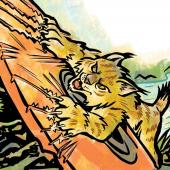



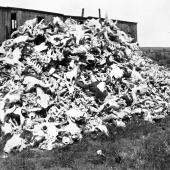
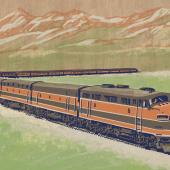
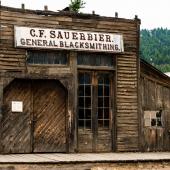





Leave a Comment Here